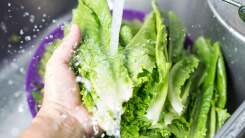Is washing lettuce really enough to rid it of harmful bacteria like E. Coli? Unfortunately, the answer is not as reassuring as we might hope.
An Illusion of Safety
Despite our best efforts to maintain a clean and healthy diet, recent studies have shown that simply washing lettuce does little to eliminate the presence of E. Coli bacteria. This sobering revelation challenges the widely held belief that a quick rinse under running water is sufficient to ensure food safety.
A Persistent Threat
E. Coli, a notorious bacterium known for causing severe gastrointestinal illnesses, can cling stubbornly onto the surface of lettuce leaves even after thorough washing attempts. The microscopic crevices and folds on the leaf’s surface provide ideal hiding spots for these resilient pathogens.
A Deceptive Culprit: Contaminated Water
In many cases, it is not actually the lettuce itself that carries E. Coli but rather contaminated irrigation water used during cultivation or processing stages. This means that no amount of rinsing at home can truly guarantee protection against this potentially dangerous bacterium.
The Need for Vigilance
Given this disheartening reality, it becomes crucial for consumers to exercise caution when handling and consuming fresh produce such as lettuce. Implementing additional preventive measures such as cooking or steaming vegetables before consumption can significantly reduce the risk posed by E.Coli contamination.
In Conclusion
While washing your lettuce may give you a false sense of security, it unfortunately falls short in effectively eliminating E.Coli bacteria from its surface due to their ability to persistently cling on despite rinsing attempts.
To safeguard ourselves against this potential health hazard, it is essential to remain vigilant and adopt additional precautionary measures when handling and preparing fresh produce.


